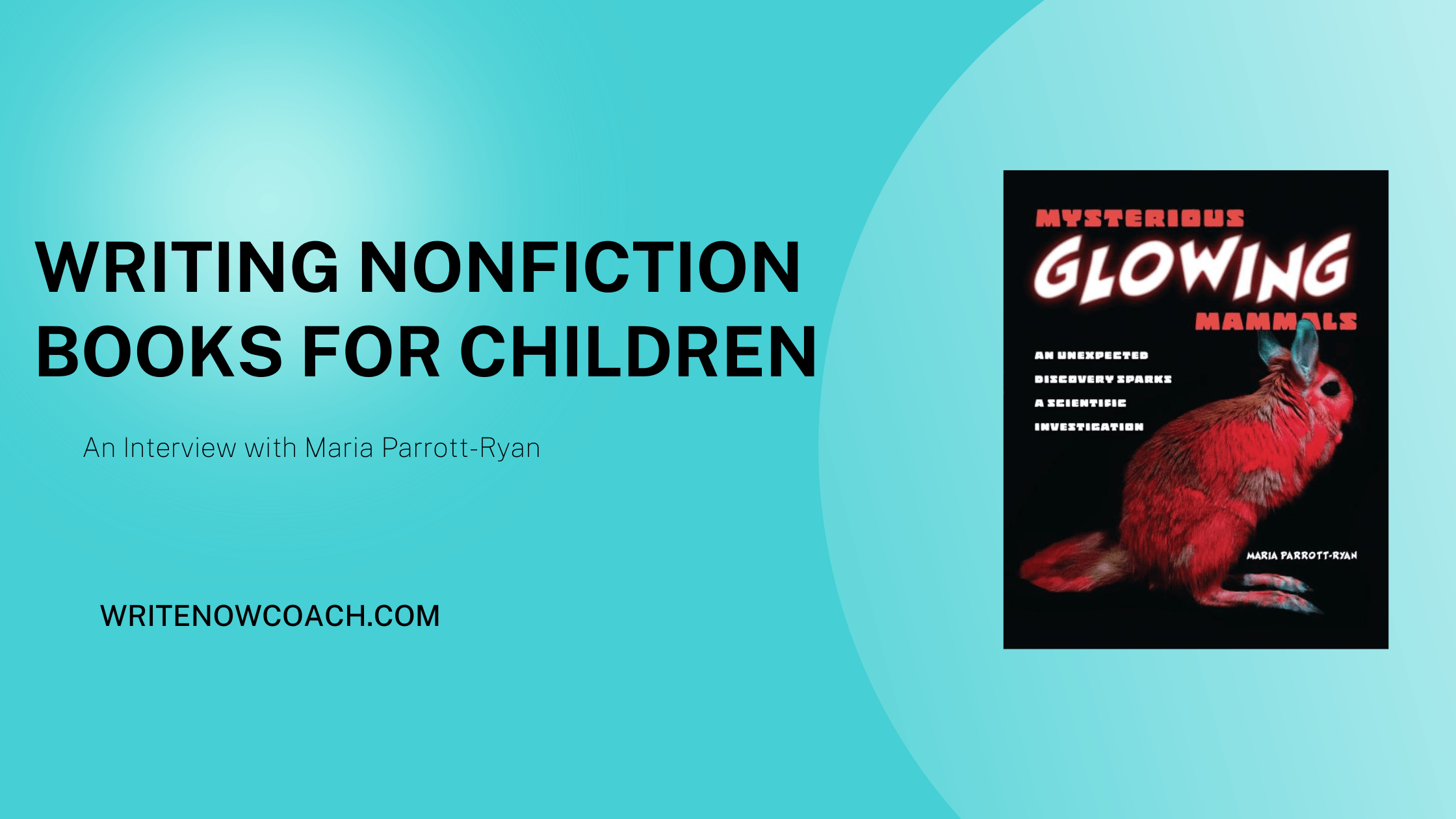Writing Nonfiction for Children
September 5, 2023
Note From Rochelle
Dear writers,
I am on my way out of town for an end-of-summer break. I’m looking forward to a few days away from my computer and email, wandering around new neighborhoods and museums and thinking about the next writing project.
I often want to start a new project in the fall. Something to do with school starting and all that! If you’re working on a writing project and need accountability, think about joining the Writing Accountability Group. We start at the end of September.
For today’s tip, I interviewed Maria Parrott-Ryan, a friend and colleague with a new book out today! You’ll love hearing about how she found the story and took it from proposal to book.
Happy writing,
Rochelle, the Write Now! Coach
Writing Nonfiction for Children
An Interview with Author and Editor Maria Parrott-Ryan
Tell us about how you got the idea for your new book Mysterious Glowing Mammals: An Unexpected Discovery Sparks a Scientific Investigation and what it’s about!
A few years ago, I read a National Geographic article about some scientists who discovered that flying squirrels glow pink under UV light. That subject alone was enough to pique my interest, but then I found out that the scientists were all based in my home state of Wisconsin. And one of them had made the initial discovery in his own backyard! That detail made me think this could be a great story to share with young people. Later those same scientists announced that platypuses also glow under UV light. That was it—I knew kids would find this story as fascinating as I did. I had to write about it.
My book explores how and why these odd animals glow, but it also follows that group of scientists as they conduct an investigation into this mysterious phenomenon. There’s rigorous science, exciting discoveries, compelling questions, unintentionally useful mistakes, and some silly jokes for good measure. It’s a fun story that entertains while showing young people how science works in the real world.
How did you get the book deal—did you write a proposal or write the book? Any tips for our readers who need to write a book proposal?
I sold Mysterious Glowing Mammals on proposal. The biggest “tip” I can give is to make your book proposal as thorough and well-thought-out as you can. A proposal is not an idea—it’s a blueprint. You need to have a very clear vision of what you want your book to be, and you must make that vision clear to agents and editors. Doing this will help you actually write the thing, too.
My proposal included a one-page overview of the book (essentially what you’d include in a query letter), a brief author bio, a competitive analysis that included a list of comp titles, a detailed chapter outline, a sample chapter, a bibliography, and a list of the Next Gen Science Standards related to the concepts in my book.
Comp titles are really important and worth doing lots of research to get right. I chose titles that covered a similar topic, targeted the same audience, and had the same format and storytelling approach as the book I envisioned. I think that helped my acquiring editor more easily picture what I had in mind and see how the book might fit into their list.
In addition to writing books, you work as an editor for Wisconsin Historical Society Press. What have you learned as an editor that has helped you as a writer.
As an editor, I’ve gotten insight into the business side of publishing, which has opened my eyes to the many circumstances that go into whether a manuscript is accepted or rejected and the massive amounts of work it takes to turn a manuscript into a book. As a writer on the outside, it’s so hard to understand how this industry works. Decisions agents and editors make can seem baffling, based completely on whims or trends. Working inside publishing has helped me appreciate the fact that some projects really aren’t right for a certain publisher—that’s not just a generic line that gets slapped on form rejection letters. It has also helped me better understand why things take SO. LONG. This knowledge hasn’t helped me improve my craft, but it has (slowly) helped me change my perspective and expectations for success. I hope that one day it will make me more patient, too. Any day now…
What are your tips for finding time and focus for writing when life is busy?
I work full-time and have a family, so life is always busy. I write or research for an hour or so (almost) every morning, first thing. Doing so consistently has helped train my brain to focus and get to work. In the morning, I’m not already distracted by all the other things I have to do that day. I also find that after I get up from my desk, my brain keeps reflecting on my work-in-progress during the quiet moments as I’m showering, commuting, etc. And I love going about the rest of my day knowing I’ve already devoted time to my creative life. Of course, there are certainly mornings when I don’t accomplish much beyond staring at the screen, but I’ve learned to accept that those mornings are just part of the process.
I know mornings aren’t possible for everyone, but I do think it’s important to carve out some time every day at the same time, even if you can only work for 30 minutes. Stick to that consistent time for long enough that it becomes a habit.
What are you reading now?
I recently finished one of the most delightful and unexpected middle grade novels I’ve read in a long time—The Many Assassinations of Samir, the Seller of Dreams by Daniel Nayeri. Funny and sad and wise and wonderful.
Right now, I’m reading Ed Yong’s I Contain Multitudes: The Microbes Within Us and a Grander View of Life. Yong’s writing is so sharp and smart, and I so admire his talent for telling complex, compelling science stories with a sense of wonder and humor.

About the author. Maria Parrott-Ryan lives with her family in Madison, Wisconsin, where she writes fiction and nonfiction for young people. Mysterious Glowing Mammals is her first book









